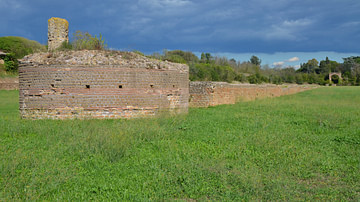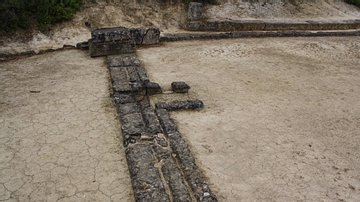Illustration
The Circus of Maxentius is the best-preserved Roman circus in Rome and is second only in size to the Circus Maximus. It lies outside the city, between the second and third milestones along the Appian Way (Via Appia). This circus was part of a large palace complex built by Emperor Maxentius between 306 and 312 CE. The track of the Circus of Maxentius was 503 metres (1650 ft) long and 79 metres (259 ft) wide. It had a capacity for 10,000 spectators.
The towers would have contained the mechanism for raising the carceres (starting gates), which were positioned on an arcuated course between the towers.
About the Author
Cite This Work
APA Style
Raddato, C. (2024, May 27). Circus of Maxentius, Towers and Starting Gates. World History Encyclopedia. Retrieved from https://www.worldhistory.org/image/18981/circus-of-maxentius-towers-and-starting-gates/
Chicago Style
Raddato, Carole. "Circus of Maxentius, Towers and Starting Gates." World History Encyclopedia. Last modified May 27, 2024. https://www.worldhistory.org/image/18981/circus-of-maxentius-towers-and-starting-gates/.
MLA Style
Raddato, Carole. "Circus of Maxentius, Towers and Starting Gates." World History Encyclopedia. World History Encyclopedia, 27 May 2024. Web. 28 Mar 2025.









